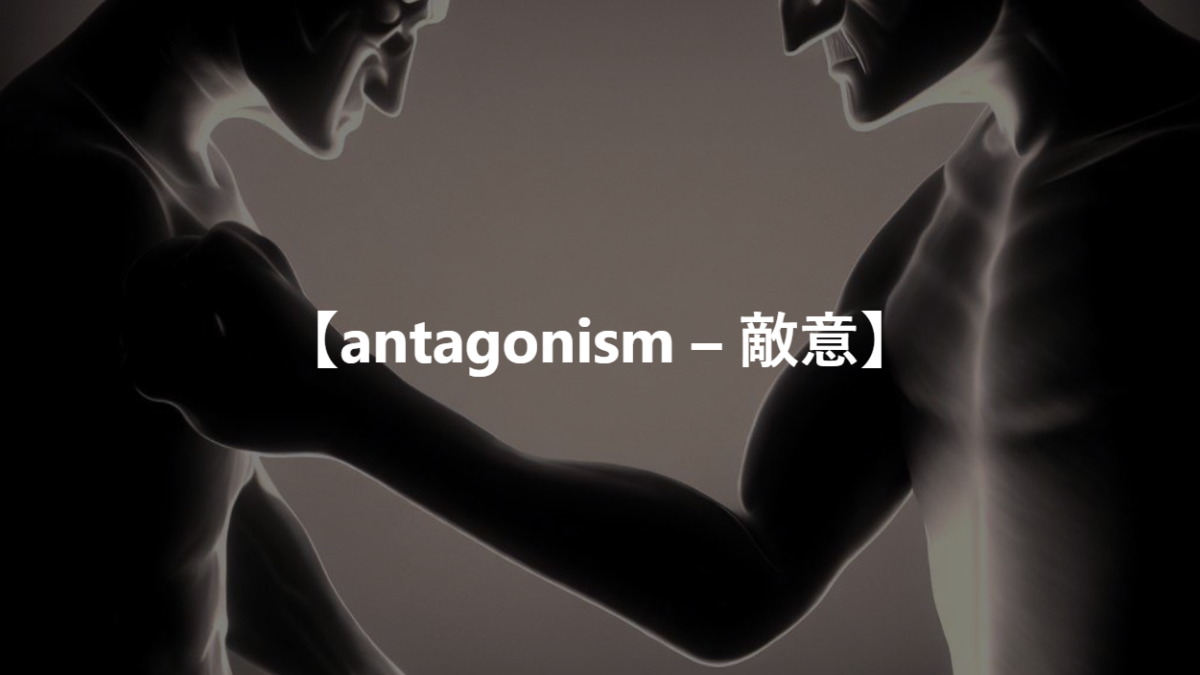語源・類義語・反対語・例文
【Antagonism – 敵意】という単語の語源とか由来を知っていますか?
「Antagonism」(敵意)という単語は、ギリシャ語の「antagonizesthai」に由来しています。この言葉は、「antagonistēs」(相手役や競争相手)から来ており、「anti-」(対抗)と「agon」(闘争)という単語を組み合わせたものです。「agon」は古典ギリシャ時代の競技会や戦闘を指す言葉であり、そこから「競争」や「戦い」の意味を持つようになりました。したがって、「antagonism」は本来、相手に対抗すること、または敵対することを意味し、これが時間を経て、より広い意味での敵意や反対、対立といった概念を表すようになりました。
The word “Antagonism” (hostility) originates from the Greek “antagonizesthai.” This term comes from “antagonistēs” (opponent or competitor), which is a combination of “anti-” (against) and “agon” (struggle). “Agon” refers to contests or combats in classical Greece, from which it came to mean “competition” or “fight.” Thus, “antagonism” originally meant to oppose or be hostile towards someone, and over time, it has come to represent a broader concept of hostility, opposition, or conflict.
この単語の類義語・反対語を教えてください。
類義語
- Hostility: 敵意、反感
- Opposition: 反対、抵抗
- Rivalry: 競争、対抗
- Enmity: 憎しみ、敵意
- Conflict: 対立、争い
反対語
- Cooperation: 協力、共同
- Harmony: 調和、和合
- Agreement: 同意、協定
- Friendship: 友情、友達関係
- Alliance: 同盟、連合
この単語に似た単語で間違いやすい単語はありますか?
- Antagonist – 直接的な敵意を持つ人や物、または物語の敵役を意味します。「Antagonism」が敵意や対立の状態を示すのに対し、「Antagonist」はそのような状況を引き起こす具体的な人物や要因を指します。
- Antagonize – 他人を敵に回す、またはある人やグループとの敵意を引き起こす行為を指します。「Antagonism」が状態を指すのに対して、「Antagonize」はその状態へと導く行動を意味します。
- Agonist – 主に医学や生理学で使われるこの単語は、特定の受容体に結合し、活性化する物質を指します。運動や薬理学の文脈で使われることがありますが、「Antagonist」とは対照的な作用を持ち、「Antagonism」と混同されやすいです。
この単語を使った例文を5つほど教えてください。
There was a strong sense of antagonism between the rival gangs.
(ライバルのギャング間には強い敵意がありました。)
The political debate was marked by intense antagonism between the candidates.
(政治的な討論は候補者間の激しい対立によって特徴づけられました。)
The antagonism between the two nations escalated into armed conflict.
(二つの国家間の敵意は武力衝突へとエスカレートしました。)
His sarcastic comments were filled with antagonism towards his colleagues.
(彼の皮肉なコメントは同僚に対する敵意に満ちていました。)
The resolution of the dispute required both parties to overcome their antagonism and seek common ground.
(紛争の解決には、双方が敵意を乗り越えて共通点を探し求める必要がありました。)
【antagonism – 敵意】のコロケーション
- Mutual antagonism (相互の敵意): 二つのパーティー、グループ、または国家間で互いに感じられる強い反感や敵意を指します。この表現は、関係が非常に対立している状況を示しています。
- Deep-seated antagonism (根深い敵意): 長い時間をかけて形成され、簡単には解消されない深い敵意や反感を表します。このような敵意は、しばしば過去の出来事や経験に根ざしています。
- Racial antagonism (人種間の敵意): 異なる人種や民族間で感じられる敵意や偏見を指します。このコロケーションは、人種差別や社会的な分断を表現する際に使われます。
- Political antagonism (政治的敵意): 政治的な意見やイデオロギーの相違から生じる敵意や対立を指します。この表現は、政党間、または政治的立場が異なる人々間の緊張を示しています。
まず、「Mutual antagonism」、つまり「相互の敵意」は、二つのパーティーがお互いに強い敵意を抱えている状態を示します。政治的な対立や個人間の不和など、幅広いシーンで使われる表現です。
次に、「Deep-seated antagonism」、これは「根深い敵意」と訳されます。こちらは、時間をかけて深く根付いた、簡単には解消されない敵意を指します。この敵意は、長年にわたる経験や出来事から生じるもので、人々の間の深刻な分裂を象徴しています。
また、「Racial antagonism」、つまり「人種間の敵意」は、異なる人種や民族間で見られる敵意や偏見を指し、社会的な課題や人種差別に光を当てる際に用いられます。
そして、「Political antagonism」、これは「政治的敵意」という意味です。政治的な立場や意見の違いから生じる対立や緊張を示すために使われ、特に政治的なディスカッションや議論において頻繁に登場します。
これらのコロケーションを通じて、「antagonism」が持つ複雑さや、それが人々の間にどのような影響をもたらす可能性があるかを理解することができます。敵意は単に感情の一つではなく、社会的、文化的な背景に根ざした深い問題を反映していることが、これらの表現から伺えます。
First, “Mutual antagonism” refers to a situation where two parties harbor strong hostility towards each other. This expression is used in a wide range of scenarios, including political conflicts and personal discord.
Next, “Deep-seated antagonism” translates to “deep-rooted hostility.” It points to hostility that has taken time to deeply embed itself and is not easily resolved. This kind of hostility arises from experiences or events over many years, symbolizing serious divisions among people.
Furthermore, “Racial antagonism,” meaning “hostility between races,” denotes the hostility or prejudice observed between different races or ethnic groups and is used when highlighting social issues or racial discrimination.
Then, there is “Political antagonism,” which means “political hostility.” It is used to indicate conflicts or tensions arising from differences in political stances or opinions, frequently appearing in political discussions or debates.
Through these collocations, we can understand the complexity of “antagonism” and how it might impact relations between people. Hostility is not merely an emotion but reflects deep issues rooted in social and cultural backgrounds, as evidenced by these expressions.
antagonismを使った英文法問題5問
- 語彙問題次のうち、antagonismの意味として最も適切なものはどれですか?
- a. 友情
- b. 協力
- c. 敵意
- d. 無関心
- c. 敵意antagonismは「敵意、対立、反目」という意味の名詞です。
- 空所補充次の文の( )内に入る最も適切な単語はどれですか?
- The ( ) between the two countries led to a trade war.
- a. antagonist
- b. antagonistically
- c. antagonistic
- d. antagonism
- d. antagonism空所には主語になる名詞が入ります。antagonismは「敵意」という名詞です。
- 冠詞の選択次の文の( )内に入る適切な冠詞はどれですか?
- ( ) antagonism between the two characters was palpable.
- a. A
- b. An
- c. The
- d. 無冠詞
- c. The特定の2人のキャラクター間の敵意を指しているため、定冠詞のtheが適切です。
- 語形変化次の文の( )内に入る適切な単語はどれですか?
- The two groups had an ( ) relationship.
- a. antagonism
- b. antagonistically
- c. antagonistic
- d. antagonize
- c. antagonistic空所には名詞relationshipを修飾する形容詞が入ります。antagonisticは「敵対的な」という意味の形容詞です。
- 文法的な誤りの指摘次の文には文法的な誤りが1箇所あります。その誤りを含む部分を指摘し、正しい形に直してください。
- The antagonisms between the two political parties made it difficult to pass any legislation.
- 誤り: antagonisms
- 正しい形: antagonismantagonismは不可算名詞であるため、複数形にはなりません。

